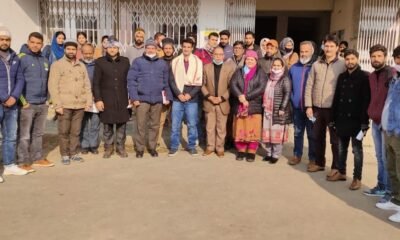Business Kashmir is excited to feature Jasir Altaf Haqani, an experienced data scientist and FinTech product manager with a remarkable track record of driving innovation in the financial services industry. Jasir has been recognized with the prestigious Citi-IDC award for his work on the Citi-Paytm co-branded credit card project. The International Data Corporation (IDC) is a premier global market intelligence, data, and events provider for the information technology, telecom, and consumer technology markets. With more than 1,300 analysts worldwide, IDC offers global, regional, and local expertise on technology and industry opportunities and trends in over 110 countries. This recognition further cements Jasir’s status as a leader in FinTech. Throughout his career, Jasir has consistently utilized his expertise in data science and analytics to develop groundbreaking solutions that have transformed businesses and empowered individuals.
Today, we’re diving into Jasir’s journey, exploring his vision for the future of FinTech, and delving into his passion for inspiring the next generation of tech talent.
Q. Jasir, your journey in the tech industry is nothing short of inspiring. From pioneering digital assets custody platforms to leading transformative projects at Citigroup’s innovation lab, your impact has been truly extraordinary. Can you share with us some highlights from your remarkable career so far?
Thank you for your kind words. It’s been an incredible journey filled with opportunities to drive innovation and make a meaningful difference in the world of FinTech. Each project has presented its own unique challenges and rewards, but I’m particularly proud of the work we’ve done to leverage emerging technologies and reshape the future of finance.
Q. Looking back at your career, what project or initiative are you most proud of and why?
One project that stands out for me is the development of the Citi-Paytm co-branded credit card in India. Citi’s market share was stagnant due to limited reach, and I led the team in designing a machine learning model to assess customer creditworthiness and recommend features for the card. This model played a crucial role in acquiring new customers in Tier 2 and 3 cities, leading to a significant increase in account acquisition (1 million in the first year) and sales ($25 million). It’s an example of how data science can revolutionize traditional financial systems, and I’m proud to have been at the forefront of this innovation that not only benefited Citi but also expanded financial inclusion in India.
Q. In your experience, what are some of the biggest challenges facing the tech industry today? How do you see yourself contributing to solutions for these challenges?
One of the biggest challenges is the ethical integration of new technologies. As a leader who champions responsible innovation, I prioritize data privacy and security in all my projects. Furthermore, the lack of diversity and inclusion in tech hinders progress. I actively promote initiatives that encourage women and underrepresented minorities to pursue tech careers, fostering a more equitable and innovative environment. Additionally, the rapid pace of technological change can create a skills gap. I’m passionate about mentorship and knowledge sharing, and I plan to continue empowering future generations by providing them with the tools and guidance they need to thrive in the ever-evolving tech landscape.
Q. We know you are involved in mentoring students at the University of Kashmir, and it’s evidently making a big change. Can you elaborate on your leadership style and how you inspire the next generation of tech talent?
My leadership style is a blend of mentorship and empowerment. I believe in fostering a collaborative environment where students feel comfortable taking risks and exploring their ideas. I inspire them by sharing my own experiences, highlighting the transformative power of technology, and showcasing real-world applications of their theoretical knowledge. By providing guidance and encouragement, I help them develop not just technical skills but also critical thinking, problem-solving, and leadership abilities – all essential for success in the tech industry.
Q. As a leader in the tech community, how do you encourage collaboration and innovation among local professionals?
Collaboration is key to accelerating innovation. I actively participate in industry events and conferences, fostering connections between local professionals. I also believe in knowledge sharing – I organize workshops and hackathons that provide opportunities for collaboration and the exchange of ideas. Furthermore, I leverage my network to connect aspiring entrepreneurs with established mentors and investors, creating a supportive ecosystem for local tech talent to flourish.
Q. What advice would you give to aspiring tech professionals who are just starting their careers?
Firstly, cultivate a strong foundation in the fundamentals of computer science and data analysis. Secondly, never stop learning – immerse yourself in the latest trends and developments. But remember, technical skills are just one piece of the puzzle. Develop strong communication and soft skills to effectively collaborate and translate complex ideas into actionable solutions. Finally, don’t be afraid to take risks and experiment. Embrace challenges and learn from your failures. Most importantly, find your passion within the vast tech landscape and use your skills to create a positive impact on the world.
Q. Imagine the tech landscape five years from now. What exciting advancements do you foresee?
The future is brimming with possibilities! I foresee advancements in AI and machine learning leading to even more personalized experiences across various sectors. Additionally, the rise of quantum computing has the potential to revolutionize fields like drug discovery and materials science. Furthermore, the integration of the physical and digital worlds through the metaverse will create new opportunities for innovation and connection. As tech leaders, it’s our responsibility to navigate these advancements responsibly and ensure they benefit humanity as a whole.



 Industry3 years ago
Industry3 years ago


 Energy4 years ago
Energy4 years ago


 Economy1 year ago
Economy1 year ago


 Infra3 years ago
Infra3 years ago


 AgriBiz3 years ago
AgriBiz3 years ago


 Careers4 years ago
Careers4 years ago


 Economy4 years ago
Economy4 years ago


 Industry4 years ago
Industry4 years ago





















